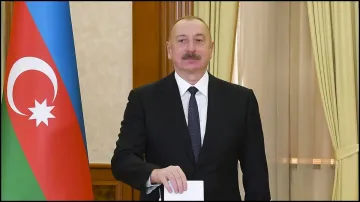Azerbaijan's Ilham Aliyev, bolstered after retaking Karabakh, re-elected for fifth term after landslide win
Azerbaijan President Ilham Aliyev secured more than 90 per cent of the votes, as his victory was expected after his government reclaimed the Nagorno-Karabakh region. Azerbaijan regained parts of Karabakh from ethnic Armenian separatists in a military operation in September.

Baku: Azerbaijan President Ilham Aliyev secured a landslide victory in the country's presidential elections held on Wednesday, winning 92 per cent of the votes among the 93 per cent of ballots counted so far, as per preliminary results. This marks Aliyev's fifth seven-year term in office, already expected after his government swiftly reclaimed the Nagorno-Karabakh region, controlled by ethnic Armenian separatists for three decades.
In an unprecedented display, none of the other candidates on the ballot so far has won more than 3 per cent, with the runner-up getting just 2.19 per cent of the votes, said Mazahir Panahov, the head of Azerbaijan's Central Election Commission. Three of the other candidates have already conceded and congratulated Aliyev on his winning re-election, according to local media.
Aliyev was also congratulated by Russian President Vladimir Putin and Ukrainian President Volodymyr Zelenskyy. He and Putin spoke about continuing their “strategic partnerships,” according to the Azeri leader’s press service. Zelenskyy posted his congratulations on X, saying that he appreciated Azerbaijan’s humanitarian assistance to Ukraine and valued the “mutual support for our states’ sovereignty and territorial integrity.”
Other leaders, including Turkish President Recep Tayyip Erdogan, Hungary's Prime Minister Viktor Orban and Iran's Ebrahim Raisi, also offered congratulations.
Widely expected outcome
The 62-year-old Aliyev has been in power for more than 20 years, succeeding his father who was Azerbaijan’s Communist boss and then president for a decade when the country became independent after the 1991 collapse of the Soviet Union. Aliyev called for an early vote to capitalise on his burst in popularity following September’s retaking of Nagorno-Karabakh.
Election officials indicated turnout was strong, saying that over 76 per cent of eligible voters cast ballots during the 11-hour voting. Even before the preliminary results were announced, several hundred people carrying Azerbaijani flags gathered in Baku to dance and sing in celebration. Aliyev has declared that he wanted the election to “mark the beginning of a new era,” in which Azerbaijan has full control over its territory.
The region, which had been known internationally as Nagorno-Karabakh, and large swathes of surrounding territory came under full control of ethnic Armenian forces backed by Armenia at the end of a separatist war in 1994. Azerbaijan regained parts of Karabakh and most of the surrounding territory in 2020 in a six-week war, which ended with a Moscow-brokered truce in 2022.
Azerbaijan’s two main opposition parties — Musavat and the People’s Front of Azerbaijan — did not take part in the vote, and some opposition members alleged it may have been rigged. Aliyev will also be in the limelight in November when Azerbaijan, a country that relies heavily on revenues from fossil fuels, hosts a UN climate change conference.
The war in Nagorno Karabakh
Nagorno-Karabakh is a landlocked region in the Caucasus Mountains and is home to around 120,000 ethnic Armenians. After the collapse of the Soviet Union, ethnic Armenians took control over the region in 1994 after a bloody war. However, the region was recaptured by Azerbaijan in 2020 in a six-week war. Since then, Nagorno-Karabakh has been internationally recognised as part of Azerbaijan's sovereign territory.
However, Azerbaijan alleges that Armenia has smuggled in weapons since then. The claims led to a blockade of the road connecting Nagorno-Karabakh to Armenia in December in 2022, causing severe food and medicine shortages in the region. The blockade also prevented humanitarian assistance during Azerbaijan's military offensive this week.
In September, Azerbaijan launched an "anti-terrorist" operation involving heavy artillery firing, which caused 100,000 ethnic Armenians fled the region as the separatist forces were defeated and forced to lay down their arms. When he visited the city in November, Aliyev said in a speech at a military parade marking the victory that “we showed the whole world the strength, determination and indomitable spirit of the Azerbaijani people.”
In the 1990s, the Azerbaijani population was itself expelled from Nagorno-Karabakh and hundreds of thousands of people were displaced within Azerbaijan. Many people have been relocated to recaptured territories in Nagorno-Karabakh as part of Azerbaijan's "Great Return" programme.
(with inputs from AP)